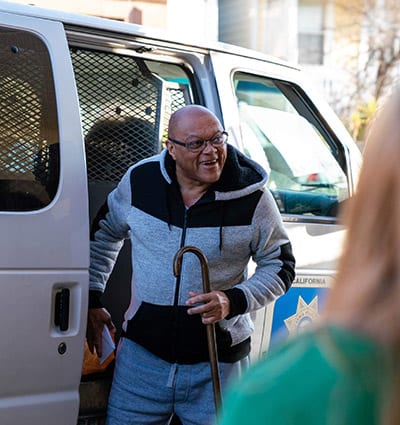
By Andrew Cohen
The parole process is grueling, littered with maddening hurdles, and usually unsuccessful. But when self-awareness and personal accountability lead to freedom, the result is transformative for everyone involved.
After joining Berkeley Law’s Post-Conviction Advocacy Project (P-CAP) during their first semester on campus, Alex Copper ’20 and Sydney Royer ’20 spent 2½ years working with San Quentin prisoner Larry Histon. Incarcerated for more than two decades and twice denied parole, Histon was recently released—thanks largely to the students’ unwavering dedication to his case.
“I felt that my life finally mattered to someone,” he says.
Copper and Royer met with Histon at least monthly for several hours at a time, and corresponded between visits. They also assigned readings and written assignments to help him gain perspective about his crime, its implications, and the man he once was.
They never backed down, Histon adds, in pushing him to face difficult but pivotal issues. In one meeting, the students directly confronted his past abusive behavior.
“I almost fell out of the chair. I was in shock and on the verge of getting angry and defensive,” he says. “Instead, this proved to be a tremendous growth opportunity. Our discussions broadened my understanding of what abuse is and the ways that my past actions, habits, and values led me to be abusive.”
Together, they worked through a disheartening parole denial, a subsequent successful appeal vacating the denial and issuing a new hearing, a joyous grant of parole, a plea to California Gov. Gavin Newsom—and 150 days of waiting for a final decision.
Support system
P-CAP students are supervised by UnCommon Law’s Keith Wattley (founder and executive director) and Lilliana Paratore ’17 (supervising attorney), who gave Copper and Royer valuable feedback on their written correspondence and hearing strategy.

“Most importantly, Keith and Lilli taught us how to have the hard conversations needed to help our client confront the parts of himself of which he was most ashamed,” Copper says. “They taught us that compassionate, firm honesty is the best type of advocacy.”
While Copper and Royer spent hundreds of hours working on Histon’s case, most inmates receive a state-appointed lawyer who might meet with them once before their hearing. The data shows the impact of that contrast: Since P-CAP’s founding in 2013, its clients have been granted parole in more than 60 percent of its hearings compared to 20 to 25 percent statewide.
Royer notes that parole grants depend on navigating a treacherous three- to six-hour hearing filled with unpredictable and often painful interactions.
“Even if prisoners have truly evolved, if they can’t articulate insight about the most traumatic aspects of their lives in the manner expected by the parole board—a skill many clients may simply lack, through no fault of their own—they may be forced to spend the rest of their life in prison,” she says.
Before law school, Copper worked on class action litigation dealing with conditions of confinement in juvenile detention centers and adult private prisons across Mississippi. Seeing what it meant to help people regain their freedom, she wanted to experience that as a law student.
“P-CAP gave me that opportunity,” she says. “It’s one of the things that brought me to Berkeley Law, among the many other avenues for legal service and pro bono work.”
A new narrative
Royer hopes Histon’s release will help debunk the notion that people who commit violent crimes are incapable of personal transformation or less deserving of rehabilitative programs and other criminal justice reforms.
“Often those are the people who would benefit most … and who can emerge from prison as contributing members of society—but they need to be given the opportunity and the resources to grow,” she says. “Personal transformation often requires introspection, personalized programming, and outside counseling, which are not readily available to inmates, particularly those serving life sentences.”
This fall, Copper will begin a one-year fellowship at the Campaign Legal Center in Washington, D.C., working on election law and voting rights issues, before clerking for Judge Valerie Caproni in the Southern District of New York. Royer will embark on a federal clerkship for Chief Judge Barbara Lynn in the Northern District of Texas.
Both describe working with P-CAP, UnCommon Law, and Histon as a glittering law school highlight. In particular, they cite the moment just before his last parole hearing, when the three of them prayed together (Histon was actively involved with the ministry in San Quentin and credits his faith as a key factor in his transformation), and greeting him just after his release.
“While I’m not religious, I knew that praying together as a team would further the mutual trust within our team and allow us a moment of peace before the chaos of the hearing,” Royer says. “Mr. Histon prayed over Alex and me, and it brought me to tears. He expressed his gratitude for having us on his team, and I felt a similar gratitude toward him.”
Now living in transitional housing in Concord, Histon hopes to re-enter the information technology profession after completing UC Berkeley’s Coding Boot Camp and Project Management Professional Certification Program.
“Alex and Sydney gained my trust with their ongoing display of genuine compassion and honesty,” he says. “The absolute hardest part for me was confronting the moral character of the man I used to be. They always held my feet to the fire and encouraged me to consider the perspective and feelings of the other person in my case on any given issue, which enabled me to develop a true sense of accountability.
“When the hearing took place, that helped me more earnestly represent the man I used to be—and who I am today.”